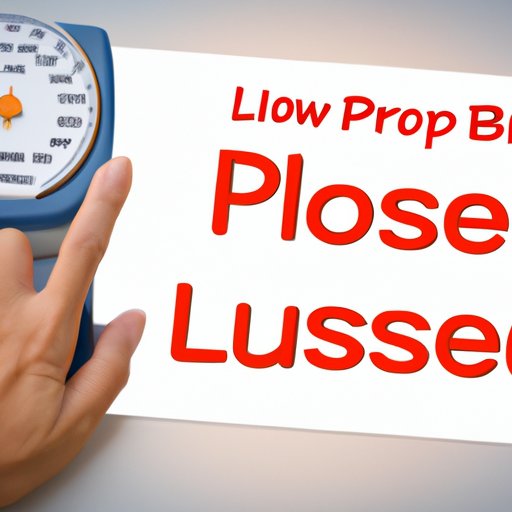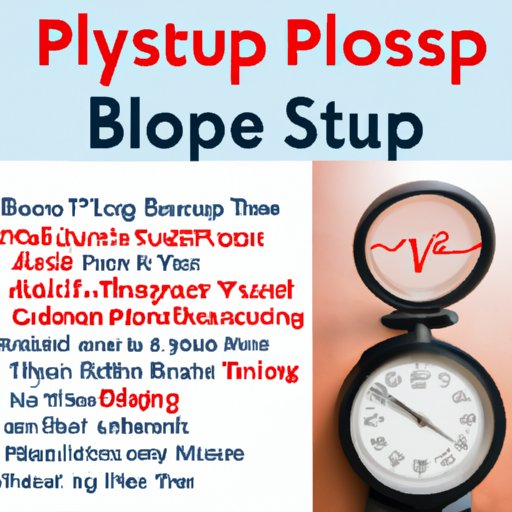
Introduction
Low blood pressure, also known as hypotension, is a relatively common condition where the pressure of blood flowing through your arteries is lower than normal. While low blood pressure isn’t generally considered a medical emergency, it can cause negative symptoms such as dizziness, fainting, and fatigue. In this article, we’ll explore the link between low blood pressure and feelings of exhaustion, and what you can do about it.
Reasons Why Low Blood Pressure Can Make You Feel Tired and How to Address It
Low blood pressure can impact your energy levels in several ways. Here are some of the most common factors:
Insufficient Oxygen Supply to the Brain
When your blood pressure drops too low, your brain may not receive enough oxygen-rich blood to function properly. This can result in feelings of dizziness, headaches, and fatigue.
Vascular Problems
Low blood pressure can be caused by issues with your blood vessels. For example, your arteries may have become dilated or too relaxed, causing blood to pool in your veins instead of being transported throughout your body. This issue can impair organ function, leading to feelings of fatigue and weakness.
Dehydration
If you’re dehydrated, your blood volume decreases. This can lower your blood pressure and lead to feelings of dizziness and fatigue. Make sure you’re drinking enough water throughout the day to avoid dehydration.
Management Techniques for Low Blood Pressure
If you’re experiencing regular bouts of fatigue caused by low blood pressure, consider incorporating the following habits into your daily routine:
- Stay hydrated by drinking 6-8 glasses of water per day
- Avoid standing up too quickly as this can cause a sudden drop in blood pressure
- Gradually increase your salt intake to boost your blood volume
- Wear compression stockings to improve blood flow in your legs
Investigating if Low Blood Pressure Could Be the Cause for Your Chronic Fatigue
Chronic fatigue is a persistent and overwhelming feeling of tiredness that lasts for a prolonged period (typically 6 months or more). While there are many factors that can cause chronic fatigue, low blood pressure is one potential cause.
Symptoms of Chronic Fatigue
If you’re experiencing chronic fatigue, you may also experience the following symptoms:
- Difficulty concentrating or remembering things
- Muscle pain and weakness
- Joint pain without inflammation or redness
- Sore throat or tender lymph nodes
Diagnosing Chronic Fatigue Due to Low Blood Pressure
If you suspect that your chronic fatigue may be caused by low blood pressure, make an appointment with your doctor. They can perform a physical examination and run diagnostic tests to determine if hypotension is the cause of your symptoms.
Treatment Options for Chronic Fatigue Caused by Low Blood Pressure
If your chronic fatigue is caused by low blood pressure, treatment options may include:
- Medications such as fludrocortisone and midodrine to raise your blood pressure
- Salt supplements to increase your blood volume
- Changes to your lifestyle, including diet and exercise habits
How to Differentiate Between Fatigue Caused by Low Blood Pressure and Other Health Issues
If you’re experiencing feelings of exhaustion, it can be challenging to determine what’s causing your symptoms. Here are some common symptoms of other health conditions that can cause tiredness:
Common Symptoms of Different Health Conditions
- Depression – feelings of sadness, hopelessness, and a lack of motivation
- Anemia – fatigue, pale skin, shortness of breath, and headaches
- Thyroid problems – weight gain or loss, anxiety, and dry skin
- Diabetes – fatigue, frequent urination, and extreme thirst
Diagnostic Tests for Other Health Issues
If you’re experiencing any of these symptoms, consider making an appointment with your doctor. They can perform diagnostic tests to determine the cause of your tiredness, which may include blood tests, imaging scans, or other medical exams.
When to Consult a Doctor
If you’re experiencing regular and persistent feelings of fatigue, it’s always a good idea to talk to your doctor. They can help you determine what’s causing your symptoms and recommend appropriate treatment options.
Understanding the Link Between Low Blood Pressure and Feelings of Fatigue
When your blood pressure drops too low, your body responds by attempting to restore balance.
The Body’s Response to Low Blood Pressure
If your blood pressure drops too low, your nervous system triggers a series of responses to bring it back up to normal levels. This includes constricting your blood vessels, increasing your heart rate, and releasing hormones like adrenaline and cortisol. These responses can leave you feeling tired and exhausted.
The Effect of Low Blood Pressure on Internal Organs
Low blood pressure can also impact the performance of your internal organs, which can further exacerbate feelings of fatigue. When your blood pressure is too low, your organs may not receive enough oxygen-rich blood, which can lead to impaired function and feelings of weakness.
Managing Fatigue Caused by Low Blood Pressure
If you’re experiencing feelings of exhaustion caused by low blood pressure, there are several steps you can take to manage your symptoms:
- Exercise regularly to improve your cardiovascular health and increase your energy levels
- Adopt a healthier lifestyle by quitting smoking, reducing alcohol intake, and eating a balanced diet
- Eat foods rich in vitamins and minerals, such as fruits, vegetables, and lean proteins

Tips and Tricks to Help You Manage Your Tiredness Caused by Low Blood Pressure
If you’re battling fatigue caused by low blood pressure, consider incorporating these tips and tricks into your daily routine:
Regular Exercise
Regular exercise can help you improve your cardiovascular health and increase your energy levels. Aim for 30 minutes of moderate exercise per day, such as brisk walking or cycling.
Adapting to a Healthier Lifestyle
Adopting a healthier lifestyle can also help you manage your tiredness. Try quitting smoking, reducing your alcohol intake, and eating a balanced and nutritious diet. These changes can help you feel more energized and improve your overall health.
Diet Recommendations for Low Blood Pressure
If you’re looking for dietary recommendations for hypotension, consider incorporating the following foods into your meals:
- Caffeine (in moderation) – can constrict your blood vessels and raise your blood pressure
- Salt – can increase your blood volume and help to raise your blood pressure
- Water – make sure you’re drinking enough water to avoid dehydration, which can lower your blood pressure
- Omega-3 fatty acids – can help to improve your cardiovascular health
Debunking Common Myths Surrounding Low Blood Pressure and Fatigue and What You Actually Should Know
Myths About Low Blood Pressure
There are several myths surrounding low blood pressure and fatigue, including:
Myth: Low blood pressure is always a sign of poor health
Fact: Many healthy individuals experience low blood pressure without any negative symptoms. Hypotension is only considered a medical issue if it causes negative symptoms, such as fatigue, dizziness, or fainting.
Myth: Experiencing fatigue is normal if you have low blood pressure
Fact: While low blood pressure can cause fatigue, it’s important to seek medical attention if you’re experiencing regular and persistent bouts of exhaustion
Tips for Managing Low Blood Pressure
To manage your low blood pressure, consider incorporating the following habits into your daily routine:
- Eat a balanced diet that includes healthy fats, lean proteins, and fresh fruits and vegetables
- Exercise regularly to improve your cardiovascular health
- Stay hydrated by drinking enough water throughout the day
- Avoid standing up too quickly as this can cause a sudden drop in blood pressure
Note: As with any medical condition, it’s always a good idea to talk to your doctor before making any significant lifestyle changes or starting a new exercise routine.
What to Do If You Continue to Feel Tired
If you continue to experience feelings of exhaustion despite making lifestyle changes or seeking medical attention, it’s essential to continue advocating for yourself. Be proactive about communicating with your healthcare providers and don’t stop seeking answers until you find effective treatment options.
Conclusion
Low blood pressure can cause feelings of exhaustion and fatigue, but with the right diagnosis, management techniques, and lifestyle changes, it’s possible to improve your symptoms. If you’re experiencing regular bouts of fatigue, make an appointment with your doctor to discuss potential causes and treatment options.
Final Recommendations
To manage your low blood pressure and feelings of fatigue:
- Stay hydrated
- Avoid standing up too quickly
- Incorporate regular exercise into your routine
- Adopt a healthy and balanced diet
- Communicate with your healthcare providers to determine the best course of treatment.





